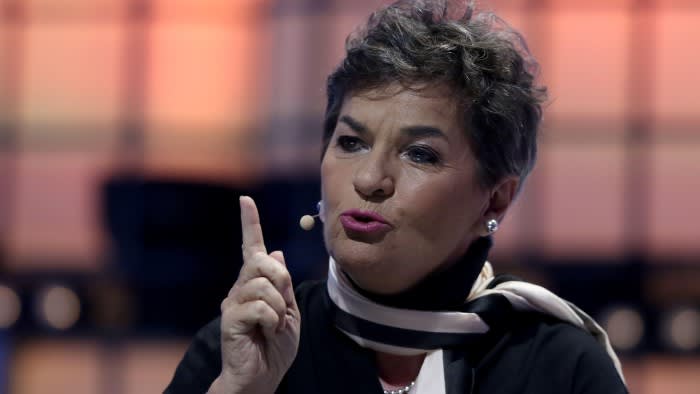Stay informed with free updates
Simply sign up to the Climate change myFT Digest — delivered directly to your inbox.
Governments are being urged to set ambitious climate plans by a group including Ikea and Unilever as concerns rise that politicians are weakening measures to tackle global warming amid a growing “greenlash”.
A coalition of businesses, mayors, governors and investors calling themselves Mission 2025 has formed in support of robust climate action and is backed by former UN diplomat Christiana Figueres.
Figueres, who oversaw the UN’s climate change arm at the time of the landmark 2015 Paris agreement to tackle rising global temperatures, told the Financial Times that Mission 2025 aimed to rebut the view that moving faster on tackling the climate crisis was “too difficult, too unpopular or too expensive”.
Several companies have in recent months rolled back on net zero and other environmental measures, with some critics arguing that businesses are responding to mixed messages from governments.
In December, governments agreed at the COP28 climate summit to transition from fossil fuel, but there are also signs that countries are slowing or rolling back on climate action.
Germany last year watered down a proposal on greener boilers after a backlash from homeowners, while the EU this year scrapped a target on agricultural emissions after protests from farmers.
Green politicians also suffered big election losses in Europe this month, leading to suggestions that voters are no longer as supportive of ambitious climate policies.
The Mission 2025 group is calling for governments to ensure that new national climate plans for the next decade — known as nationally determined contributions (NDCs) — are strong enough to limit global temperature rises to 1.5C above pre-industrial levels. Under the Paris agreement, countries have to submit fresh plans every five years, starting from 2020, with the next round due in 2025.
Last year, the UN said the world was on course for a temperature rise of up to 2.9C under existing government pledges, a rise that would have a catastrophic impact on countries around the world.
Research published this month by the Energy Transitions Commission, a think-tank, argued that the rapidly falling costs of clean technologies and other solutions meant that countries could feasibly put the world on a 2C pathway — the upper threshold of the Paris agreement.
Adair Turner, chair of the Energy Transitions Commission, said the NDCs should set out plans and policies for all sectors and greenhouse gases, as well as outlining what type of financing will be required — which will differ significantly country by country.
Figueres argued that the extreme heatwaves being experienced around the world, including in the US where about 100mn people were under a heat warning in June, showed that ambitious NDCs were “absolutely necessary”.
Such plans were “totally possible and deliverable”, she said, arguing that businesses needed clear policy from governments in order to make investment decisions, and that voters also wanted politicians to take action.
A UN development programme poll last week found that 80 per cent of people globally wanted their governments to take stronger action to tackle the climate crisis.
Hein Schumacher, chief executive of Unilever, said ambitious national climate plans would enable governments to “mobilise their economy to decarbonise whilst unleashing new opportunities for growth”.
National governments including the US have also looked to introduce restrictions on green imports, prompting criticism that such measures will cause a slowdown in climate action.
Kristalina Georgieva, head of the IMF, last week pushed back against green tariffs, arguing: “We are in a world in which we don’t have the luxury of time to advance the green transition.”
Additional reporting by Paola Tamma in Luxembourg


